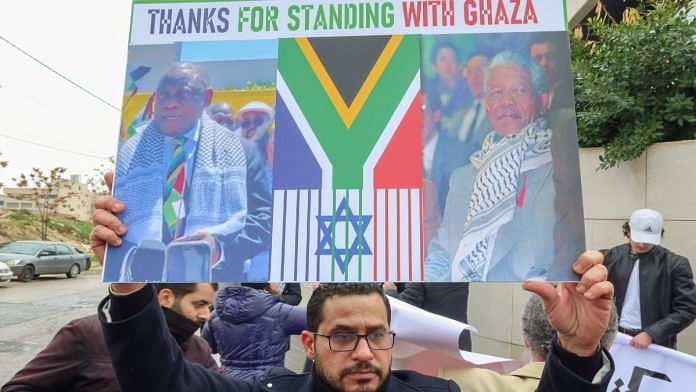New Delhi: One of the most memorable moments underlining South Africa’s long-standing support for the Palestinian cause was in 1990, when Nelson Mandela, while meeting African leaders in Algiers just two weeks after being released from jail, donned a black and white Palestinian scarf known as the keffiyeh. Eight years later, he would warmly embrace Palestinian leader and key figure in the Oslo Accords, Yasser Arafat, upon the latter’s arrival in South Africa for a state visit.
“Your name is revered by millions in South Africa,” Mandela said at the banquet dinner held in Cape Town on 11 August 1998, in honour of his guest. “You come as a leader of a people who have shared with us the experience of struggle for justice,” he added.
With South Africa taking Israel to the International Court of Justice (ICJ) over alleged war crimes and “genocide” in Gaza, it’s clear that Mandela’s policy on the Israel-Palestine conflict endures.
During the apartheid years, the Palestine Liberation Organization (PLO) extended consistent support to Mandela’s African National Congress (ANC). It was also under Mandela’s government that Pretoria established formal relations with the State of Palestine in 1995.
Lessons from apartheid appear to be at the crux of South Africa’s case against Israel. The 84-page application submitted by Pretoria’s legal team to the ICJ mentions the word “apartheid” four times.
On Thursday, South Africa’s legal team didn’t mince words during the proceedings. John Dugard, one of the team’s high-profile lawyers and a former UN Special Rapporteur on Human Rights in the Occupied Palestinian Territory, went as far as to say Gaza has turned into “a concentration camp”.
Since the war in Gaza began following Hamas’ attacks on Israel on 7 October, South Africa as well as several Latin American states have emerged as some of the most critical voices against Israel’s military operation in Gaza, which has claimed over 20,000 lives.
In November, South Africa downgraded ties with Israel and called for the closure of the Israeli embassy in the country.
But putting aside South Africa’s long-standing support for the Palestinian cause, experts say there could be other motives for the country to take this case to the ICJ, especially during an election year. Some also point out that this trial “embarrasses” Israel’s closest ally — the US — which would clearly benefit China and Russia, also close allies of South Africa.
Also Read: How Gaza hospital blast united Arab world against Israel amid Tel Aviv’s attempts to normalise ties
South Africa’s motives
South Africa’s case against Israel at the ICJ comes at a time when the African country is gearing up for elections and as incumbent President Cyril Ramaphosa seeks re-election. He belongs to the African National Congress (ANC), a party that has continued to reap electoral benefits based on the party’s pivotal role in the country’s struggle for independence.
This November, South Africa will also take on the G20 Presidency baton from Brazil for 2025. Therefore, experts say its motives behind taking Israel to the ICJ could also come from its desire to project itself on the international stage.
“South Africa has always backed the Palestinian cause. There is the entire history of colonialism as well with anti-apartheid activists being close to Palestinian leaders. But this is also South Africa trying to project itself on the international stage, plus its election year,” Abhishek Mishra, Associate Fellow at the Manohar Parrikar Institute for Defence Studies and Analyses (IDSA), told ThePrint.
In 2019, South Africa downgraded its embassy in Tel Aviv to a liaison officer, he said.
“Then in 2021, it rejected the African Union (AU) decision to grant Israel as an observer. So, there’s always been a suspicion of the West,” Mishra said, suggesting that this move could help Pretoria gain lucrative investments from Arab countries in the future.
While China and Russia have voiced support for South Africa’s case at the ICJ, the US has dismissed it. Last week, US National Security Council spokesperson John Kirby called the lawsuit “meritless” and “counterproductive”.
Rajiv Bhatia, former ambassador to South Africa, pointed out that Moscow and Beijing will benefit from the “embarrassment” caused by the ICJ proceedings.
“The move is embarrassing not only to Israel but also to its ally and protector, the US. In that sense, it is helpful to the adversaries of the US, Russia and China — the two nations with which South Africa enjoys close relations,” he told ThePrint.
While South Africa’s legal team presents its case to the top international court on 11-12 January, a final judgement could take years.
“Maybe a provisional ruling can be expected which may result in an order to temporarily cease offensive operations in Gaza but a final ruling could take years,” Mishra told ThePrint.
More so as ICJ rulings have not always been followed by nation-states. For example, in 1986, the ICJ ruled that US military actions in Nicaragua were in violation of international law. But this was vehemently rejected by Washington.
Concerns have also been aired about the internal politics of the ICJ’s 15-judge bench, specifically the President of ICJ, Joan Donoghue.
“The ICJ will be subject to its own internal political dynamics among its fifteen judges. The President of the ICJ, Judge Joan Donoghue, is a career technocrat that has served as a Legal Adviser to the US State and Treasury Departments, which some observers suggest that she may be partial to Washington’s preference to dismiss the case,” writes Tim Murithi, Head of the Peacebuilding Interventions Programme at the Institute for Justice and Reconciliation in Cape Town, in a piece for German political foundation, Heinrich Böll Foundation.
The President of the ICJ has the power to cast the deciding vote if the bench is divided.
(Edited by Uttara Ramaswamy)
Also Read: Israel war on Gaza has gone beyond ‘right to self-defence’ to ‘responsibility to protect’



